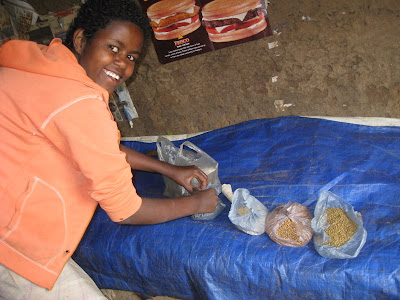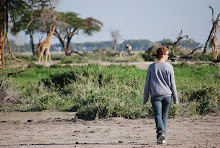I’ve written before about Ethiopian hospitality and how it’s unrivaled, but even after living here for so long it still knocks me off my feet sometimes. I’m a fairly hard person to surprise. I see things coming, read into foreshadowing, and pick up on subtle signs. But this incredible hospitality often gets past my radar and surprises me more that anything.
The morning after my friend from home, Chris, arrived in Ethiopia I made him board a bus at 5am heading north to Dangila. This ride is something I’ve become used to enduring by now, although it never can end soon enough. Around 3pm we finally arrived in Dangila, exhausted from the journey. We loaded our luggage into a bajaj taxi and were taken straight to my house. As I opened the gate to my compound, waiting patiently inside was my student/friend Aregach. As we got all our belongings inside I realized she went back outside and was bringing in a pot and basket, filled with the special holiday food duro wat and injera.
I later found out that Aregach, who had been fasting from meat for two weeks (as were all Orthodox Christians), postponed her holiday celebration by several days just so she would have duro wat (chicken stew) for our arrival. She also came over to my house over two hours before we arrived by bus and waited patiently for us to show up!
My new friend/neighbor Taish came over to join the celebration as well. The four of us ate the delicious food and hung out for a couple hours which was more than anything I could have asked for. Aregach is such a wonderful friend and she teaches me new things every day about loving and giving. It was a great welcome back to Dangila.
During Chris’s week-long visit in Ethiopia we only stayed in Dangila for a couple days, which meant we had a LOT of coffee and food invitations to squeeze into a short amount of time. And Chris had only been in Ethiopia for less than 24 hours when we got to my town, meaning his experience with, and acquired taste for injera was minimal. He was a great sport to eat whatever happened to be put in front of him.
After we went to my final class of my summer English club, one of my students invited us over for coffee and lunch. We enjoyed listening to American music (from the CD I’d given my perfect attendance students as a prize), drinking the three rounds of delicious coffee, and stuffing ourselves with yet another meal of injera and wat. I think by this point Chris was finally getting the hang of what my life is like here!
After we went to my final class of my summer English club, one of my students invited us over for coffee and lunch. We enjoyed listening to American music (from the CD I’d given my perfect attendance students as a prize), drinking the three rounds of delicious coffee, and stuffing ourselves with yet another meal of injera and wat. I think by this point Chris was finally getting the hang of what my life is like here!
Then finally, on our last day in town, we stopped in my neighbor’s house to say “hi” and found ourselves leaving several hours later, stuffed to the brim. It was not altogether unexpected since I often spend hours at a time laughing and eating in their house, but it surely was nothing less than an adventure with Chris there. We sat for the longest time just drinking the rounds of coffee as I played translator between the family and Chris. We were all set to leave when the mother insisted on making something for us to eat (since she had promised me the week before that she’d make something special when my friend arrived), so we got comfortable knowing there is no turning down such a generous invite. Luckily we saw Taish walk passed their house and called him in to eat with us, adding another stomach to divide the food between.
Dangila is full of surprises and every time one of them hits me, it makes me want to stay until I discover them all. With the end of my time here in sight I really am trying to live every day to the fullest, and sometimes that is referring to the state of my stomach. The culture I’ve experienced here of entertaining neighbors and guests is something I hope to carry with me throughout life. It is beautiful, selfless and loving. I think we can all learn something from a culture like that. On that note, I’m here for five more months and very open to more visitors… any takers?































